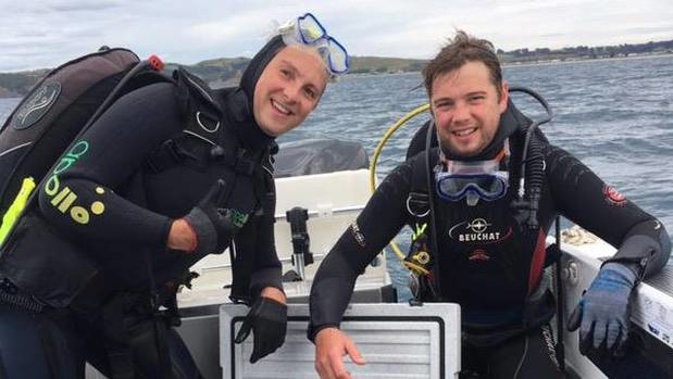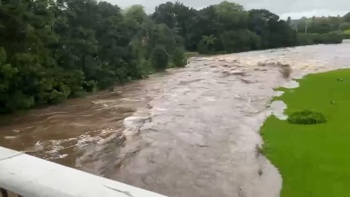
When Chris Williams surfaced from his dive off Omaha Beach with a haul of scallops, the last thing he expected was to see his boat drifting into the horizon.
The Aucklander is attributing his prompt rescue from the water after the engine on the boat failed to a raft of safety precautions and the quick thinking of the boaties on board.
Williams, 30, was out diving with his brother last Friday afternoon when the pair found themselves stranded in the water.
"As we surfaced, we quickly realised the boat was no longer in sight," he said.
They scanned the horizon and spotted his father's boat, with his dad and another boatie on board, almost a kilometre away from their diving spot.
There was no response to their signals to the duo on board, and they quickly realised something had gone wrong.
"Probably at that time it might have been 700 or 800 metres away - within our ability to swim," Williams said.
"But that distance was growing further and further apart as we watched.
"It was very, very windy out in the water, and a six and a half metre stabicraft boat with a hard top acts like a sail in the wind."
The boat's anchor hadn't stuck on the bottom of the sea floor, allowing it to be dragged along in the wind.
What they couldn't figure out was why the pair on board weren't doing anything to get the boat back to their dive spot.
Meanwhile on board, the boaties had been dealing with their own dilemma.
Within minutes of Chris and Matt entering the water they realised the boat was drifting. But when they tried to start the engine to move the boat, the motor stalled.
They would later discover a piece of rope hanging off the end of the boat had caught around the prop of the engine - an easy fix.
But at the time, they assumed it was an electronic fault of the engine.
Realising the peril the group were in, the two boaties promptly called 111.
"They were put through to the police and they gave the way point of where we were dropped into the water, as well as where they were at that time," Williams said.
The boaties' quick thinking meant a chopper was already hovering in the area looking for them, when they popped up.
"As soon as I inflated the orange safety sausage, I noticed the choppers changed their flight path and came right in directly to us."
"Very shortly after, within probably two minutes, the Omaha IRB boat arrived and asked us, 'Hey are you guys okay, what's going on'."
They explained the situation and the IRB took them back to their boat.
As they were drawing closer to the boat, they spotted a rope dangling in the water from the engine - and figured out what had happened. They helped remove the rope and the engine whirred back into life.
A police spokesman said staff were alerted that the divers' boat had broken down and drifted away while they were in the water.
"A short time later, another boat picked up the divers and returned them to their original vessel," the spokesman said.
Neither of the divers required medical attention after the incident.
Williams said there were lessons to be learnt from the ordeal - had he and Matt not been prepared, it would have been a "very, very different scenario".
"It's not complete open ocean, but just about ... if we hadn't had our safety marker I believe the chopper would have had a lot of difficulty in finding us," Williams said.
Williams praised the work of the Coastguard and lifeguards who took part in the rescue.
"Maritime police contacted us later and they did say, 'You guys did everything right'."
"We had a dive flag on the boat, that signals to other boats that there are divers in the water, and I also carry a floating dive flag, which is attached to me at all times."
Surf Life Saving Northern Region chief executive Matt Williams said issues could crop up even for divers that did everything by the book.
While Surf Life Saving didn't look after scuba diving specifically, the organisation often responded to incidents where things had gone wrong.
Williams urged people to get PADI trained and accredited before heading out diving, take a float diving so the boatmaster knew where they were at all times, and to dive with a buddy.
"It's really basic common sense," he said.
Diving incidents leading to injury and death were "frequent and increasing" - something Williams believed was because more people were taking up diving.
Take your Radio, Podcasts and Music with you









